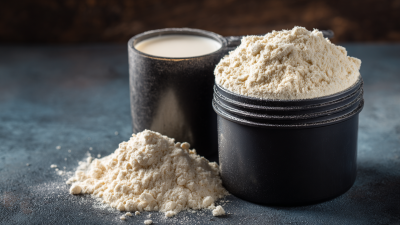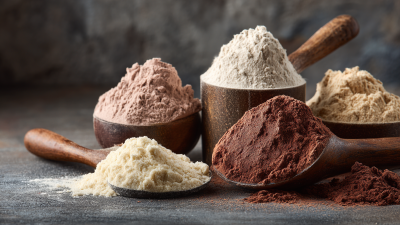In recent years, the market for Milk Protein Powder has experienced remarkable growth, driven by an increasing demand for high-quality protein supplements and functional food ingredients. According to a report by Grand View Research, the global whey protein market size alone was valued at over USD 8 billion in 2022 and is projected to expand at a compound annual growth rate (CAGR) of 8.1% through 2030. This surge can be attributed to the rising health consciousness among consumers and the growing trend of fitness and wellness. As brands seek to capitalize on this opportunity, implementing effective strategies for promoting Milk Protein Powder can significantly enhance their market presence. In this blog, we will explore actionable strategies aimed at boosting your brand visibility and consumer engagement through the innovative use of Milk Protein Powder, ensuring that your offerings meet the evolving needs of nutrition-savvy customers.

Milk protein powder is gaining popularity among health-conscious consumers, and understanding its nutritional benefits can be a game changer for your brand. Rich in high-quality proteins, milk protein powder contains both casein and whey, offering a complete amino acid profile essential for muscle repair and growth. This makes it an ideal choice for athletes and fitness enthusiasts looking to enhance their protein intake. Incorporating milk protein powder into your product offerings can help position your brand as a key player in the health and wellness market.
In addition to its protein content, milk protein powder is a source of vital nutrients such as calcium and phosphorus, which are essential for bone health. By highlighting these nutritional benefits, your brand can cater to a diverse audience, including families seeking nutritious options for their children and older adults focusing on maintaining bone density. Marketing your products with a focus on these health benefits can foster customer trust and loyalty, as consumers increasingly seek transparency and efficacy in their dietary choices. Emphasizing the versatility of milk protein powder in various products—from protein bars to smoothie mixes—can further enhance your brand's appeal and meet the evolving demands of today's market.
Creating unique product offerings with milk protein powder can significantly enhance your brand's appeal and market differentiation. One effective strategy is to experiment with flavor and texture. Consider integrating exotic flavor profiles such as matcha, chai, or even seasonal spices into your formulations. Additionally, developing products with varying textures, such as creamy shakes or crunchy bars, can cater to diverse consumer preferences and enhance the overall eating experience.
Another essential tip is to leverage the nutritional benefits of milk protein powder. Highlight its high-quality protein content, essential amino acids, and other health benefits in your marketing materials. Crafting protein-enriched snacks or meal replacement options addresses the growing demand for convenient and health-focused foods. Moreover, consider creating targeted offerings for fitness enthusiasts, busy professionals, and families, ensuring that you reach a broader audience.
Lastly, don't underestimate the power of collaboration. Partnering with influencers in the health and wellness space can amplify your product visibility. These partnerships can involve co-developing products, running campaigns, or even creating exclusive recipes that showcase your milk protein powder in unique ways, building credibility and driving consumer interest.
| Strategy | Description | Target Market | Potential Benefits |
|---|---|---|---|
| Product Innovation | Develop new flavors and formulations using milk protein powder to attract consumers looking for variety. | Health-conscious consumers, athletes, fitness enthusiasts | Increased sales, enhanced brand loyalty |
| Nutritional Education | Provide information on the health benefits of milk protein powder, including muscle building and recovery. | Fitness enthusiasts, nutritionists, health coaches | Brand credibility, informed consumers |
| Packaging Design | Invest in attractive, eco-friendly packaging that highlights the quality of milk protein powder. | Eco-conscious consumers, millennials | Improved brand image, increased shelf appeal |
| Collaborations | Partner with fitness influencers and dietitians to promote products using milk protein powder. | Social media users, fitness communities | Expanded reach, enhanced trust |
| Sampling Programs | Offer samples at gyms or health food stores to give potential customers a taste of your products. | Gym-goers, health food shoppers | Increased customer trials, higher conversion rates |
When promoting milk protein powder, effective marketing strategies can greatly enhance brand visibility and attract potential customers. One powerful approach is leveraging social media platforms to create engaging content that highlights the unique benefits of your product. High-quality images, recipe videos, and testimonials can resonate with health-conscious consumers and fitness enthusiasts. Collaborating with influencers who align with your brand values can extend your reach, as their endorsements provide authentic voices that can influence their followers' purchasing decisions.
Another essential strategy is to focus on content marketing by providing educational resources about the advantages of milk protein powder. This could include blog posts, e-books, or webinars that cover topics such as nutrition tips, workout routines, and recipes featuring your product. By establishing your brand as a trusted source of information, you can foster a loyal community around your product. Lastly, consider offering promotions, samples, or subscriptions to encourage trial and repeat purchases, making it easier for customers to incorporate milk protein powder into their daily routines.
 Leveraging social media effectively can significantly enhance brand engagement when promoting milk protein powder. First, companies should focus on creating visually appealing content that showcases the versatility and benefits of their product. High-quality images and videos of smoothies, protein-rich snacks, and fitness routines can draw attention and inspire customers to incorporate milk protein powder into their lifestyles. Platforms like Instagram and TikTok are particularly well-suited for this type of engaging content, allowing brands to connect with their audience through vivid storytelling and eye-catching visuals.
Leveraging social media effectively can significantly enhance brand engagement when promoting milk protein powder. First, companies should focus on creating visually appealing content that showcases the versatility and benefits of their product. High-quality images and videos of smoothies, protein-rich snacks, and fitness routines can draw attention and inspire customers to incorporate milk protein powder into their lifestyles. Platforms like Instagram and TikTok are particularly well-suited for this type of engaging content, allowing brands to connect with their audience through vivid storytelling and eye-catching visuals.
Moreover, influencer partnerships can amplify reach and credibility. Collaborating with fitness enthusiasts, nutritionists, and chefs who resonate with the target demographic can create authentic endorsements. These influencers can demonstrate the product's effectiveness and versatility, sharing personal experiences and recipes that encourage followers to engage with the brand. Hosting giveaways or challenges on social media can also foster a sense of community and excitement around the product, encouraging user-generated content that further promotes brand loyalty and visibility.
By actively participating in the conversation around health and wellness, brands can position milk protein powder as a staple in nutritious diets, ensuring that customers feel connected to both the product and the brand itself.
In the dynamic landscape of health and wellness, collaborating with influencers has emerged as a pivotal strategy for brands looking to enhance their reach and credibility, particularly in the niche of milk protein powder. These influencers, often regarded as trusted authorities in their fields, can effectively communicate the benefits of protein powder to a wider audience. By partnering with fitness trainers, nutritionists, or health-focused content creators, brands can tap into pre-existing communities that value authentic endorsements.

Moreover, leveraging influencer collaborations allows brands to craft compelling narratives around milk protein powder that resonate with consumers. Social media platforms provide an ideal stage for influencers to showcase product uses, highlight unique recipes, or even share personal success stories related to fitness and health journeys. This not only amplifies brand visibility but also builds a genuine connection with potential customers, who are more likely to engage with products endorsed by relatable figures. Implementing this strategy can lead to increased brand loyalty and a broader, more engaged customer base.






